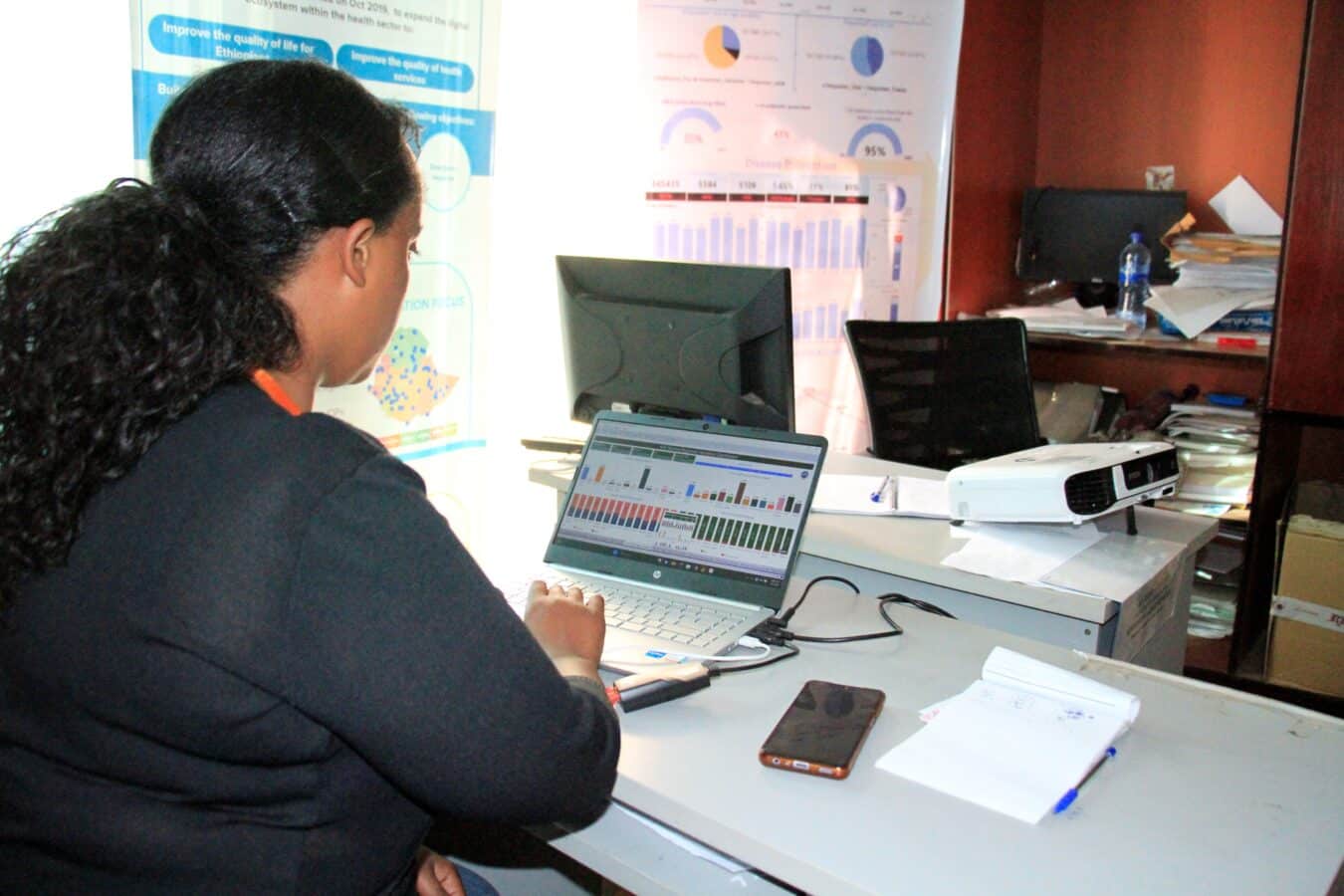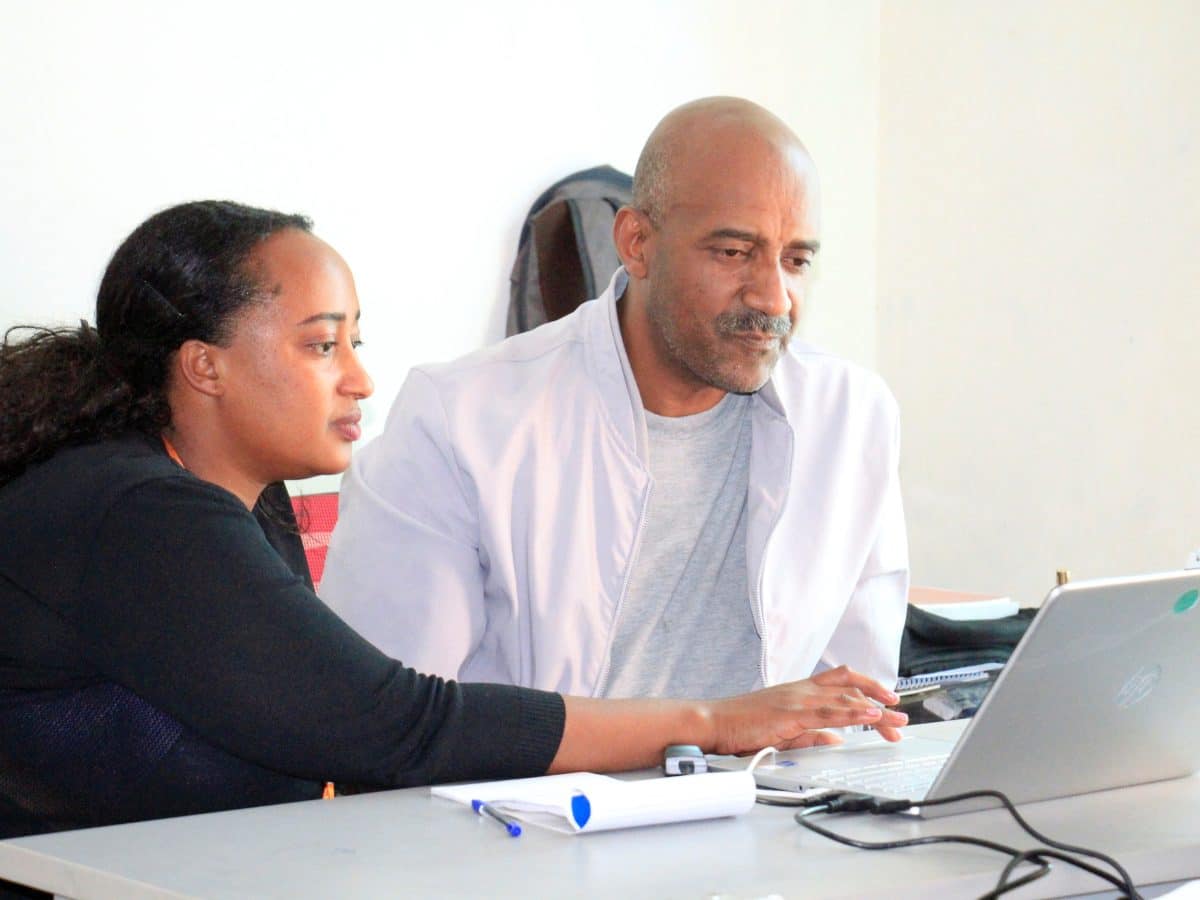Effective HIV case finding is a critical first step to ensuring that all individuals living with HIV can be linked to the treatment they need. In Ethiopia, however, insufficient data-capturing and management systems limited health care professionals in understanding the gaps that led to poor HIV case finding, and ultimately, low treatment linkage.
Supported by the U.S. President’s Emergency Plan for AIDS Relief (PEPFAR) through the Centers for Disease Control and Prevention (CDC), ICAP at Columbia University established a custom-built data capturing tool – the Priority Towns Quality Improvement Tool (PTQIT) – which doubled HIV case finding and treatment initiation rates and significantly improved data sharing across all levels of the health system.
The PTQIT system was an outcome of a 2019 program called Operation Triple A (OTA), which was a six-month campaign aiming to address HIV case finding, treatment initiation, and viral load suppression challenges across 46 health facilities in Addis Ababa, Ethiopia. In collaboration with ICAP, the CDC, and the Addis Ababa City Administration Health Bureau (AACAHB), the PTQIT system was built to strengthen OTA’s monitoring and evaluation framework, enabling the transition from monthly to weekly indicator monitoring across health facilities and districts. ICAP produced and disseminated user manuals and standard operating procedures to health facilities and provided trainings to nearly 100 potential users of the system.
By utilizing the PTQIT system, health facilities can share real-time data, enabling AACAHB to track health facility progress on HIV case finding, treatment initiation, and viral load suppression on a weekly basis. Weekly monitoring is unique in that other HIV data resources typically generate either monthly or quarterly data. The fast turnaround allows health staff to quickly address challenges that require attention and swift decision-making.
The platform has also provided essential support for tracking the implementation of newly introduced interventions, including index case testing, pre-exposure prophylaxis (PrEP), HIV self-testing services, and the Social Network Strategy (SNS), an HIV testing recruitment method.
“With the weekly data, we are able to pinpoint exactly where to focus our efforts,” said Dejene Woldemichael, database manager at AACAHB. “The tool ensures accuracy and a clearer picture of the progress made toward HIV epidemic control.”
“The weekly data monitoring meetings,” Woldemichael added, “…have enabled us to quickly identify issues hindering case finding and treatment performance and provide targeted support to address specific issues by ensuring efficient deployment of the available human and financial resources for maximum impact.”

Weekly data review – compared to monthly reviews – through the PTQIT system has helped health facilities across Ethiopia more quickly and effectively address HIV health service gaps.
The PTQIT system expanded quickly. Within six months of introduction, the PTQIT system had been introduced to 46 PEPFAR-supported priority health facilities in Addis Ababa altogether, and after one year, reached all public health facilities and select high-load private facilities across Addis Ababa. After two years, the program was operationalized at the national level – under the new name, Replicate the Operation Triple A (ROTA) – across all regions of the country.
By 2024, all districts utilizing the system have observed significant improvements in HIV case finding and treatment linkage. Overall, HIV testing rates improved from 70 percent to 85 percent, HIV case finding doubled from 40 percent to 80 percent, and treatment initiation increased from 30 percent to 60 percent. Viral load testing coverage has remained above the national target of 90 percent among eligible clients.
“Through a combination of on-site and off-site orientation and training facilitated by ICAP in collaboration with our database team, we are able to effectively visualize and analyze HIV data from PTQIT with unprecedented frequency,” said Hiwot Tamirat, a physician and HIV care and treatment lead at AACAHB. “Thanks to ICAP, we are utilizing the data we get from PTQIT to continuously enhance the care and treatment provided to patients living with HIV across all facilities in the city. Additionally, we are utilizing the data to bridge critical gaps, replicate successful interventions, and ultimately, elevate the quality of care provided to patients living with HIV.”
“Without real-time data, implementing an HIV program is like navigating in the dark,” said Kedamawit Gudeta, a mentorship coordinator at AACAHB. “We cannot talk of planning, improvement, and program intervention without accessing timely and accurate HIV data.”
“By building innovative tools like PTQIT,” said Zenebe Melaku, MD, ICAP’s country director in Ethiopia, “we empower health care providers to deliver high-quality HIV services, optimize program management, and drive remarkable progress to achieving the UNAIDS 95-95-95 goals at the country level.”
About ICAP
A major global health organization that has been improving public health in countries around the world for two decades, ICAP works to transform the health of populations through innovation, science, and global collaboration. Based at Columbia Mailman School of Public Health, ICAP has projects in more than 40 countries, working side-by-side with ministries of health and local governmental, non-governmental, academic, and community partners to confront some of the world’s greatest health challenges. Through evidence-informed programs, meaningful research, tailored technical assistance, effective training and education programs, and rigorous surveillance to measure and evaluate the impact of public health interventions, ICAP aims to realize a global vision of healthy people, empowered communities, and thriving societies. Online at icap.columbia.edu








